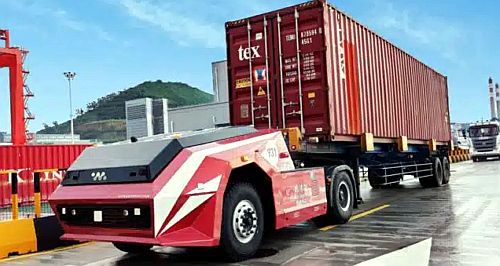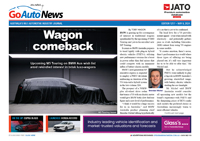Make / Model Search
News - General News - Product NewsBrisbane Truck Show abuzz with new playersEmerging Chinese and Aussie commercial vehicle brands shine at Brisbane Truck Show22 May 2023 THIS year’s Brisbane Truck Show – the largest transport industry event in the Southern Hemisphere – was the most future-focused yet, with a record number of electric, hydrogen and hybrid tech on display, of which many were Chinese imports.
Among the monstrous displays of multi-brand big hitters such as Daimler, Paccar, Penske and Volvo, as well as big Hino, Isuzu, Iveco and Sea Electric stands, were Chinese manufacturers Foton Mobility, JAC Auto and Sinotruck as well as Chinese-made products from EV Automotive, HDrive and Hyundai demonstrating both China’s lead in transport electrification and its export ambitions.
The Australian arm of troubled US hydrogen truck manufacturer Hyzon also had a Brisbane Truck Show exhibit, as did New South Wales-based pioneer of battery-swap-capable prime movers and supporting infrastructure, Janus Electric.
While Fuso, Isuzu and Iveco kept pricing cards close to their chests regarding the eCanter, N-Series EV and eDaily they respectively debuted in Brisbane, Hyundai announced a circa-$150,000 cab-chassis price (before on-road costs) for its Chinese-made Mighty Electric light-duty 7.3-tonne GVM truck ahead of its July 1 on-sale date.
For context, this is about double the purchase cost of a diesel-electric Hino 300 hybrid with 4.5t GVM, while matching the cost of an all-electric N55 EV (4.5t GVM) from Chinese brand JAC, which was positioned just down the hall from Hyundai, and undercutting Australian manufacturer Sea Electric, which told GoAuto that prices start from around $165,000 for a 4.5t GVM cab-chassis with basic tray.
Undercutting all of them was Foton Mobility, which offers its T5 electric truck as a cab chassis from $135,000 for a 4.5 tonne GVM model, and claims the model weighs half a tonne less than its competitors.
Foton Mobility CEO Neil Wang told GoAuto the company – which is also importing hydrogen fuel cell buses and trucks – was able to leverage economies of scale because it produces tens of thousands of electric trucks annually for China as well as export markets and had been the first electric truck importer to establish a national dealership network in Australia.
In a media address, Foton Mobility general manager of light-duty vehicles Bill Gillespie said 80-85 per cent of new energy vehicle (NEV) trucks sold globally are produced in China, with Foton owning a 52 per cent share of its domestic NEV market in 2022 and planning to sell 150,000 NEVs in 2025.
Between now and early 2025, Foton plans to expand its dealer network, as well as parts and service support, with target locations being Canberra, Gold Coast, Newcastle, Wollongong, and regional areas of Victoria and New South Wales.
Mr Wang added that Foton also introducing a large electric van that competes with the LDV eDeliver 9 and Ford E-Transit ($116,537 and $104,990 before on-road costs respectively), which Foton expects to sell in the region of $100,000.
Another large electric van competitor on display at Brisbane was the EC11, in van and 12-seat bus formats, imported by Brisbane-based EV Automotive and made by Chinese company Skywell New Energy Automobile Group, starting from $94,000 drive-away.
EV Automotive’s display at Brisbane also included the EC35 electric compact van similar to the Suzuki APV that EV Automotive managing director David Potter told GoAuto would sell for around $60,000, with single- and dual-cab ute cab-chassis variants also in the pipeline for similar money and badged EC31. GoAuto understands these models are produced by Chinese manufacturer DFSK Motor.
As well as announcing its Australian network of four dealers – CMV in South Australia and Victoria, Westend Group in Sydney and WestPoint Group in Brisbane, Chinese brand JAC Auto debuted its N75 (7.5t GVM) electric truck in Brisbane, which joins the N55 (4.5t and 5.5t GVM variants) and will be followed later this year by the N90 (9.0t).
Exclusively reported by GoAuto late last year, JAC’s T9 dual-cab ute will join the line-up in the second half of this year with diesel power, followed by an all-electric variant in the first half of 2024.
Sharing a stand with JAC was the Australian-designed, Chinese-made hydrogen fuel cell-powered HD49T prime mover that is about to go into service with PepsiCo Australia delivering drinks from bottling plant to distribution centre.
The HD49T is the product of a partnership between HDrive (Australasian distributor of zero-emission vehicles made by Wisdom Fujian Motor Co), and hydrogen production and refuelling infrastructure company Pure Hydrogen. HDrive also debuted its freakish-looking cabless YT75A autonomous yard truck in Brisbane, which can be optioned with battery electric or hydrogen fuel cell drivelines and can tow up to 75 tonnes.
On the topic of hydrogen, Brisbane Truck Show hosted the public debut of Hyzon’s first fully complete Australian-made and engineered heavy rigid with Superior Pak side-loading garbage truck body and proprietary hydrogen fuel cell drivetrain technology.
The vehicle on display was developed and assembled in the Melbourne suburb of Noble Park and has been sold to waste management company Remondis for operation in Wollongong, New South Wales.
Hyzon Motors Australia managing director John Edgley – who is also president of the company’s international operations encompassing Australasia and Europe – said the Brisbane debut was a “big celebration of the entire Hyzon team, to show what's possible and what we can deliver here in Australia, done and driven by Australian capability”.
“It's a fantastic local success story supported by the depth and breadth of Hyzon Motors, Inc, which is an international business headquartered in the United States and with operations in Europe and Australia.”
As GoAuto has reported, publicly traded Hyzon recently faced possible delisting after failing to meet a Nasdaq deadline to deliver financial results due in November and is planning to regain compliance with Nasdaq.
In Australia, It has a partnership with RACV and its towing subsidiary Nationwide Group to base itself at their shared Noble Park facility in return for supplying hydrogen-powered recovery trucks.
At the Janus Electric booth was an example of its compact conversion module, designed to replace the diesel engine and ancillaries – including air compressor, air-conditioning components, power steering pumps and thermal management for the electric motor and inverter – plus a fully converted Kenworth T610 prime mover with exchangeable battery packs where the diesel tanks used to be and rated to haul up to 110 tonnes.
Describing the vehicle on display as the first Australian-made electric truck – the donor Kenworth having originally rolled off the Victorian production line in 2021 – Janus Electric general manager Lex Forsyth told assembled media in Brisbane that the company can convert most prime movers manufactured after 2010 and has already done so with Freightliner, Kenworth, Mack, Volvo and Western Star vehicles.
Mr Forsyth claimed that a single trailer combination has a battery range of 400-500km depending on the number of axles, wind resistance, payload and driving style, with the heaviest-rated vehicle converted so far being a 175-tonne Volvo triple road train.
He gave the example of a forestry truck in Mount Gambier, South Australia, that operates 24 hours per day and has already covered 18,500km towing up to 68.5 tonnes of timber, with around 25 per cent of the 40MWh consumed so far harvested from regenerative braking.
A trial with Bunnings in metropolitan Brisbane saw regenerative braking contribute 50-55 per cent of energy, according to Mr Forsyth. He said the “hot swap” battery exchange process takes four minutes using a forklift and that the battery packs themselves take around four hours to charge, meaning they are ready when the trucks need re-energising.
Janus has battery swap stations in Adelaide, Brisbane, Melbourne, Mount Gambier, Port Augusta and Sydney, with plans to open solar-powered locations on the Pacific Highway to enable converted trucks to cover the Brisbane to Sydney route as part of the company’s ‘Solar Highways’ project.  Read more16th of May 2023  Hino Hybrid a ‘real world’ green solutionWe run the numbers on Hino’s 300 hybrid in back-to-back test with the diesel version4th of April 2023  EVSE charges fleet futureCo-founder and chief executive says infrastructure simplification is key to EV transition3rd of April 2023  Fleet financials: Vehicle prices to stay highSenior economist explains current key financial indicators affecting fleet managers31st of March 2023  Detour ahead for heavy vehicle regulatorNHVR shares streamlined legislation and national road network plans29th of March 2023  CEFC looks ahead to ZEV transitionGovernment’s Clean Energy Finance Corporation shares zero-emission vehicle outlook |
Click to shareGeneral News articlesResearch General News Motor industry news |











Facebook Twitter Instagram